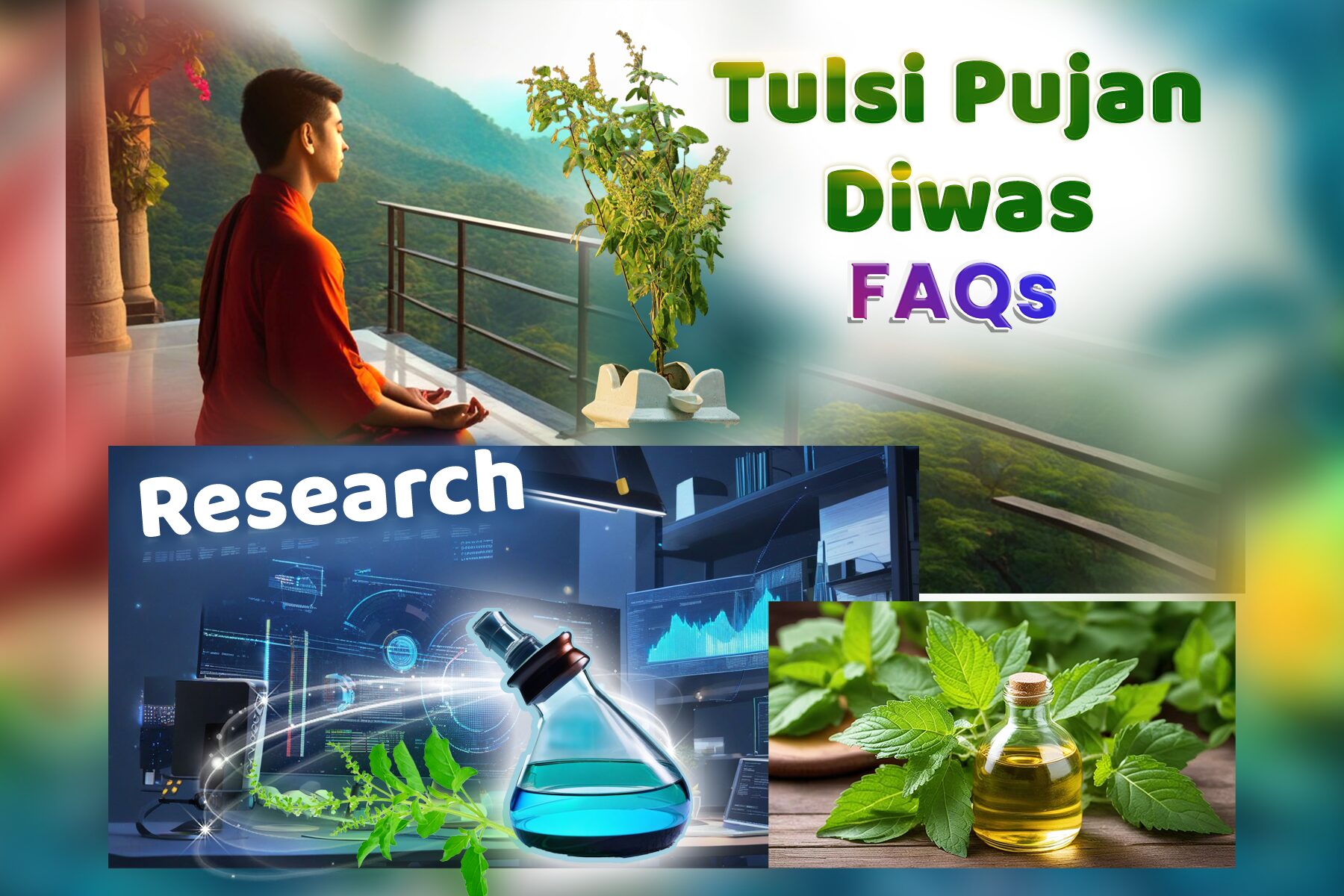
Promoting Purity: Why is Tulsi an essential plant in your home garden?
Tulsi, also known as holy basil, is a miraculous plant that needs no introduction. Sant Shri Asharamji Bapu has given Tulsi the status of mother because Tulsi takes care of us like a mother. Tulsi is not only venerable but also beneficial for the environment and health. Let us know why Tulsi is an essential plant in our home garden.
-
Tulsi: As mentioned in the scriptures
Tulsi is considered an all-encompassing remedy, easily accessible, and universally beneficial. Serving and worshiping Tulsi keeps an individual healthy and happy. It is mentioned in the scriptures that planting a Tulsi plant in the courtyard of the house and serving it, frees a person of all sins of previous births. Happiness and prosperity reside in the house where Tulsi is planted. Worshiping Tulsi daily bestows the blessings of Goddess Lakshmi along with Lord Vishnu. Lighting the earthen lamp near Tulsi regularly ensures there is no shortage of money and grains in the house. It is mentioned in the 'Skanda Purana' (:29.66): "In a house where a Tulsi is planted, and worshipped, the messengers of Yama (Yamadoot) never enter.”
-
Tulsi: An Ayurvedic Medicine
The leaves of Tulsi are found to have properties such as antibacterial, antiviral, and antifungal. The medicinal properties of Tulsi leaves are highly beneficial for health. This is why consuming its 5 to 7 leaves on an empty stomach every morning provides relief from both physical and mental health problems. After eating Tulsi leaves it is recommended to drink water in such a way that all Tulsi particles are flushed out from the gaps between the teeth.
-
Tulsi: For Family and House
It is believed that a house where Tulsi resides experiences prosperity, peace, and wealth. Tulsi not only purifies the environment and makes it pollution-free but also strengthens the roots of health and divine faith in the family.
-
Tulsi: Importance and Benefits in Life
The Tulsi plant eliminates all surrounding bacteria and viruses and produces clean air round the clock, therefore diseases do not occur where it is planted. That place becomes sacred like a pilgrimage and in such places, people live long lives. Moreover, not only in day to day life but even after death Tulsi plant is helpful for humans. Using Tulsi wood while performing funeral rites ensures the salvation of the departed soul. Pujya Sant Shri Asharamji Bapu says: "Sight of Tulsi (Darshan) in the morning is considered blissful. Sit in front of it and take deep long breaths for good health, which will reduce the chances of getting asthma. Fresh air emanating from Tulsi increases the immunity power and keeps away all diseases and harmful bacteria”. Sanatan scriptures say that Planting Tulsi and Offering a little milk to it results in the attainment of stable prosperity. Applying tilak of the soil near Tulsi enhances brilliance and radiance.
-
Tulsi: Beneficial for Protecting the Environment
Tulsi is a natural air purifier. This plant releases oxygen for about 20 out of 24 hours in a day. According to botanists, it absorbs poisonous gases like carbon monoxide, carbon dioxide, and Sulphur dioxide thereby helping in reducing air pollution. The Tulsi plant releases ozone gas which protects us from harmful ultraviolet rays of the sun. . Rich in the component of the essential oil named eugenol methyl ether, the Tulsi leaves destroy the bacteria and repel the mosquitoes. This proves that planting Tulsi is beneficial from an environmental perspective.
-
Tulsi: Boon for Health
Rich in antioxidants and vital nutrients, Tulsi is known to offer numerous health benefits, such as strengthening the immune system and reducing stress levels. According to the National Institutes of Health, i.e, NIH, (https://www.ncbi.nlm.nih.gov/pmc/articles/PMC5376420/), consuming Tulsi tea (without milk) made from its leaves can contribute to improving health and vitality. Add 5-6 Tulsi leaves to your daily routine for added benefits. Owing to its numerous health benefits, Tulsi is rightly called the ‘Queen of Herbs’ and ‘A Wonder Drug’.
-
Enhances Immunity System
Tulsi contains abundant vitamins and antioxidants that help treat common ailments such as flu, asthma, fever, and common cold. Chewing Tulsi leaves or drinking water boiled with Tulsi is effective in alleviating the symptoms of cold and sore throat. Additionally, Tulsi leaves are known to help inhibit the growth of cancer-causing and HIV-causing cells.
-
Controls Blood Pressure
Consuming Tulsi leaves helps reduce high blood pressure and cholesterol levels. Tulsi is an effective remedy for headaches, anxiety, depression, insomnia, and high blood pressure.
-
Cure to Infection
Due to the antiviral, antifungal, and antibacterial properties of the Tulsi plant, it has been used for centuries to treat wounds and infections. Additionally, its anti-inflammatory properties help expedite wound healing.
-
Helps in curing Digestion Problems
If you are troubled by digestive problems, Tulsi leaves can prove helpful. Consuming basil leaves daily on an empty stomach relieves issues like acidity and stomach burning. Additionally, it helps maintain the pH level of the body.
-
Regulates Blood Sugar
The elements present in Tulsi work like pancreatic cells, resulting in the continuous production of insulin and a reduction in blood sugar levels. Consuming Tulsi helps the proper utilization of sugar present in the blood for energy.
-
Electric Current in Body
Tulsi has the amazing ability to generate and maintain bio-electrical energy in the body. Take some Tulsi leaf juice and massage it like oil on your body, which helps improve the flow of bio-electric current. Source: Rishi Prasad, December 2016.
-
Rules for Consuming Tulsi
ulsi is prohibited with milk, otherwise, you can take Tulsi with everything like water, curd, food, etc. Tulsi leaves should not be consumed 2 hours before or after taking milk. Tulsi leaves should not be plucked and consumed on Sunday. Basil leaves are not considered stale for 7 days. Tulsi leaves should be plucked only after sunrise and before noon. “One who plucks the Tulsi leaves on the full moon day, new moon day, twelfth lunar day and Sun-Sankranti day; or in the noon or night, or at day break or sundown, or being anointed with oil, just before taking bath or in a state of impurity, acts like the killing of Lord Vishnu”. (The Brahma Vaivarta Purana, Prakriti Khanda: 21.50-51) Persons having Pitta constitution, or suffering from hemorrhage or inflammation should not consume Tulsi products during summer and autumn. Keeping a Tulsi plant in the north-east corner gives prosperity. According to The Bhavishya Purana, The Tulsi plant should not be planted on the south of a house, or else the inmates are bound to suffer from the pains given by the god of Death.
-
Tulsi: A wonder drug
Tulsi plant is beneficial in several ways and is very useful for our health, purifying the environment. Therefore, there should be Tulsi plants in the garden of our house. If you do not have a Tulsi plant in your home, go to the nearest Sant Shri Asharamji Ashram or any Nursery today, get a Tulsi plant, and plant it in your garden to reap its benefits.
- Tags :
- Share This :





